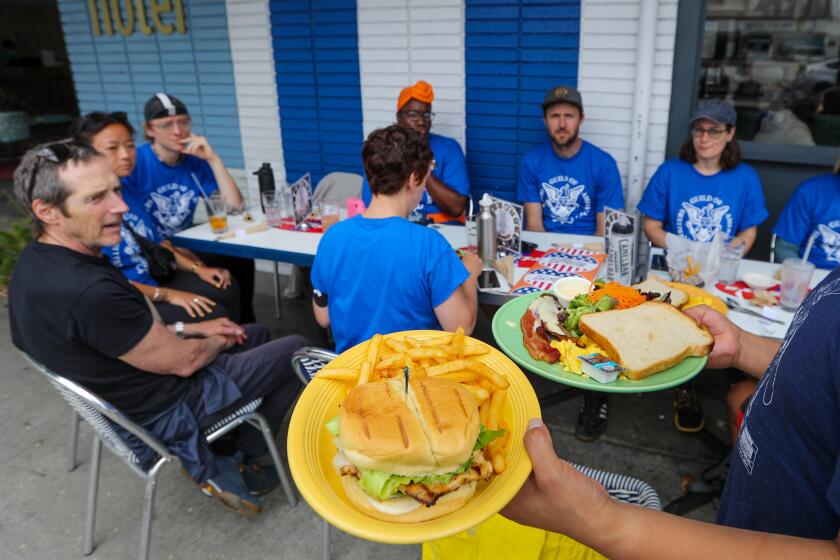California is trying again to extend unemployment benefits to workers on strike

- Share via
Months after Gov. Gavin Newsom vetoed the proposal, lawmakers in Sacramento are trying again to extend unemployment benefits to California workers who are on strike.
Under Senate Bill 1116, introduced by State Sen. Anthony Portantino (D-Burbank) and State Sen. María Elena Durazo (D-Los Angeles), California workers would be eligible to receive unemployment benefits after being on strike for 14 days.
“No one goes on strike because they want to go on strike,” Portantino said at a news conference Wednesday announcing the legislation. “People go on strike as a last resort.”
Portantino and Durazo said the bill is designed to help ease the economic pain of a strike, and to help union members withstand pressure from their employers to reach a contract deal more quickly and with less favorable terms.
They also argued that extending unemployment benefits to striking workers could help reduce the economic pain of a long-lasting strike, which can drag down other local businesses.
When the writers’ and actors’ unions in Hollywood went on strike last year, the resulting shutdown caused financial pain for workers and the businesses that help support film and television sets, including catering firms, dry cleaners and restaurants.
The Hollywood writers strike affects a culinary ecosystem dependent on catering, private events and business lunches. Some restaurants face big losses, but many are still rallying behind the strike and sending food to picket lines.
The strike bill is supported by the California Labor Federation and other labor unions. The California Chamber of Commerce and other business groups, including grocery, farm and hospital associations, opposed the bill Wednesday in its first hearings in the state Senate.
California pays up to $450 per week in unemployment payments, capped at 26 weeks. To qualify, workers must show that they are unemployed through no fault of their own and are actively looking for a job.
California Chamber of Commerce representative Robert Moutrie told a Senate committee on Wednesday morning that providing unemployment benefits to striking workers would be a “job killer” that would put the state on “one side of labor disputes.”
Striking is a difficult contract negotiation tactic, he said, that is fundamentally different from being unemployed.
Newsom vetoed the same bill last year in a rare blow to California’s powerful organized labor movement. In his veto message, Newsom wrote that expanding unemployment benefits would make the unemployment trust fund “vulnerable to insolvency.”
“Now is not the time to increase costs or incur this sizable debt,” Newsom wrote.
With the governor and California lawmakers forced to address a historic state budget deficit of at least $37.9 billion this year, convincing Newsom to change his mind will likely prove difficult.
Democratic lawmakers and Gov. Gavin Newsom are scrambling to lessen California’s budget deficit, which Newsom estimated at $37.9 billion in January.
California borrowed billions of dollars from the federal government to pay unemployment benefits during the COVID-19 pandemic.
The budget deficit and a relatively high rate of unemployment have become major barriers to reducing the debt, which stood Monday at about $20.5 billion.
Analysts for the state Senate estimated last year that providing unemployment benefits to striking workers could cost from the “low millions to tens of millions of dollars.”
“The magnitude of the impact is difficult to predict, but ultimately depends on the number of strikes that occur, the duration of the strikes, and the number of impacted employees,” analysts wrote.
The Bureau of Labor Statistics tracks strikes of more than 1,000 people, and reported at least 56 such stoppages in California between 2012 and 2022, analysts said. There were two strikes during that time period that lasted two weeks. Both were in 2022.
And in 2023, the Writers Guild of America was on strike for 148 days, and the Screen Actors Guild for 118 days.
Lorena Gonzalez, the head of the California Labor Federation, said she thought the Legislature analysis was “way off” from the actual cost to the unemployment trust.
She called for a full accounting of how much California would have paid in unemployment benefits to striking workers in 2023.
Giving strikers unemployment benefits would help buoy the local economy, Durazo said, which can face “a vicious, downward cycle.”
More to Read
Sign up for Essential California
The most important California stories and recommendations in your inbox every morning.
You may occasionally receive promotional content from the Los Angeles Times.













